In the fascinating realm of gut health, we encounter a face-off between Yakult vs Kefir – two beverages teeming with beneficial bacteria. As a Holistic Nutrition Coach and advocate of natural living and mindful nutrition, I've extensively studied the dynamics of these popular probiotic drinks. While the two have similar intentions, they are not the same! I will break down the nutritional differences between the two and show you how to easily make your own kefir at home!
Jump to:
The Importance of Gut Health
Our pursuit of clean, nutrient-packed foods goes hand in hand with nurturing our digestive health. Probiotics, those friendly microorganisms residing in our guts (good bacteria), play a vital role in our overall well-being. They're like the cheerleaders, ensuring our digestive system (and immune system) stays in top form.
Yakult
Imagine small bottles of Yakult, each containing a promise to support digestion. These bottles harbor Lactobacillus casei Shirota, a bacteria that aids gut harmony. It's like a mini boost in every sip.
But, here's the twist – when we delve into the ingredients, a pattern emerges.
While Yakult serves as a decent starting point for probiotics, it becomes evident that for a more natural and less processed approach, exploring other options might be wise.
Kefir
Enter Kefir, a tangy, traditional fermented milk drink that is similar to yogurt boasts a diverse community of probiotics.
It's like a whole team of bacteria working together for your well-being. The allure lies not only in its potential benefits but also in its DIY potential.
Making Kefir at home is simpler than you might think, and it aligns perfectly with our preference for less processed ingredients and a touch of hands-on involvement.
So, as we unravel the Yakult vs. Kefir enigma, we recognize that both have their merits.
Yakult serves as a convenient introduction to probiotics, while Kefir offers a richer microbial tapestry of live cultures and the rewarding experience of crafting it yourself.
Ultimately, it's about striking a balance between convenience and natural living and finding the path that resonates best with our holistic ideals.
Benefits of Probiotic Drinks
Probiotic drinks, like milk drinks and water kefir, are bursting with live bacteria that can truly transform our well-being. These can be dairy products, or be made with milk alternatives like coconut milk for those who may have allergic reactions to milk products.
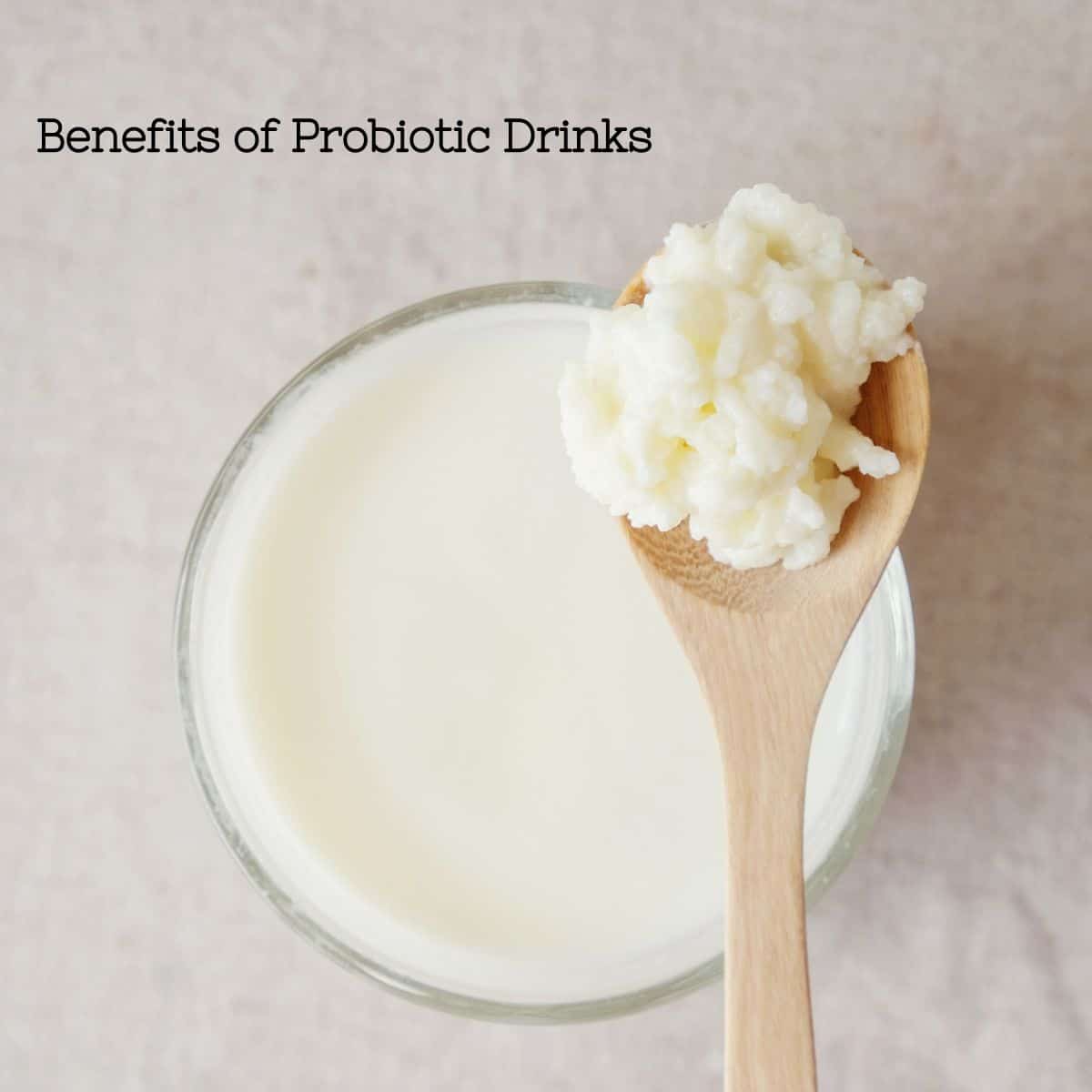
These bases are often enriched with live organisms like lactic acid bacteria (lactobacillus bulgaricus) and offer various health benefits that benefit overall health and perfectly align with a holistic health philosophy.
Probiotic-rich foods and beverages thrive on their ability to cultivate a lively digestive tract filled with beneficial live microorganisms.
These bacteria foster a balanced gut microbiome, which in turn aids digestion, enhances nutrient absorption, and even can improve mental health and wellness. (Serotonin is made in the gut!)
Those with dairy intolerance may find that the adverse effects of milk do not occur when drinking a probiotic-rich beverage.
This happens often because the lactic acid in the probiotic strains helps to encourage the small intestine to produce more lactase which is the direct digestive enzyme that breaks down the protein in milk. This has been shown in studies to have a positive effect.
Probiotic-rich choices, such as milk kefir and water kefir, go beyond aiding digestion. They actively promote the growth of helpful bacteria, crowding out harmful bacteria.
This protective function not only reduces infection risks but also boosts immunity.
Probiotic beverages can also be made from goat's milk, coconut milk, or any of your favorite plant-based milk alternatives.
Each one offers a unique nutritional profile. They're more than just a good source of protein, often providing essential vitamins and minerals like vitamin b, calcium, magnesium, potassium, and phosphorus that contribute to a comprehensive, healthy diet.
From easing lactose intolerance to offering relief for irritable bowel syndrome and inflammatory bowel disease, these beverages showcase their capacity to enhance broader well-being as a part of a balanced diet.
By nurturing a harmonious gut microbiota probiotic supplements, foods, and drinks have the power to elevate immunity, reinforcing the body's natural defense mechanisms.
 SIX Brewing Bags Plus TWO L...Shop on Amazon
SIX Brewing Bags Plus TWO L...Shop on Amazon
What is Yakult?
In recent years, Yakult has taken the spotlight as a popular probiotic drink. This little bottle of Yakult has become a go-to option for those seeking a gut health boost on the go. But what exactly is Yakult, and have you examined its ingredient labels?
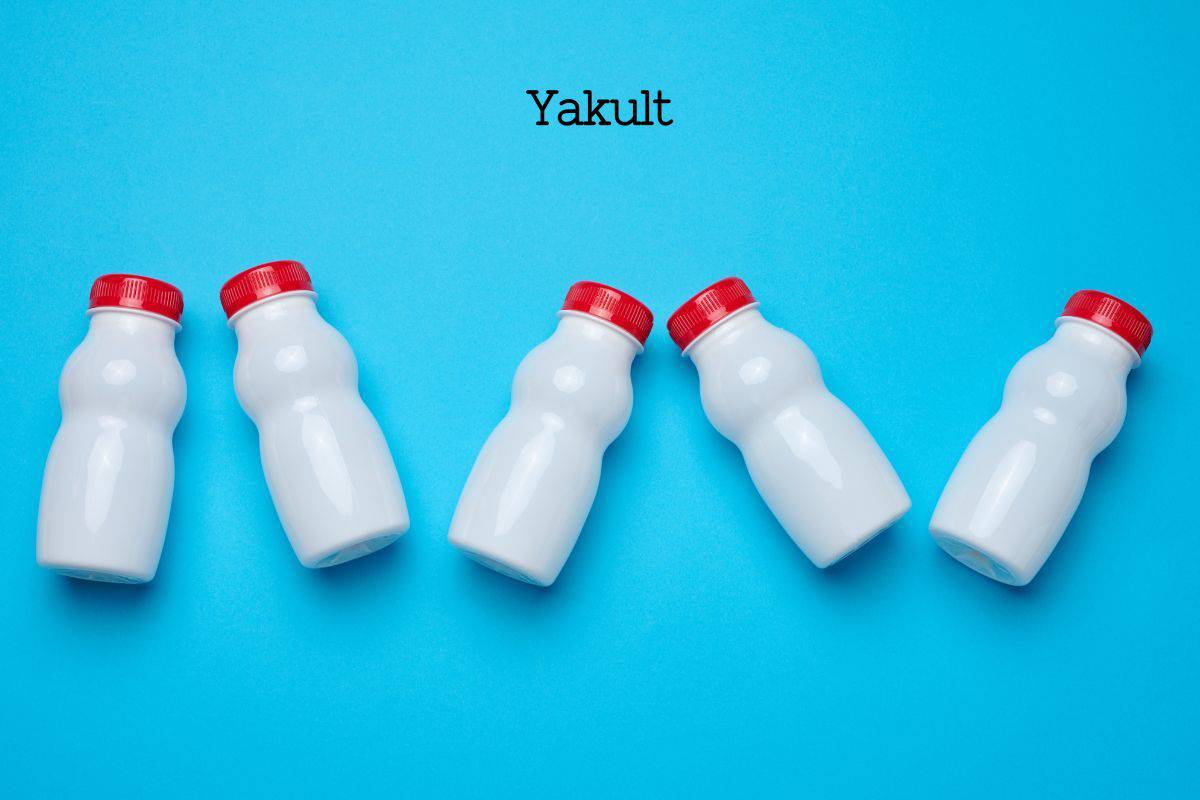
This unassuming bottle of Yakult has made quite a splash as in the yogurt section of the grocery store. It's a light, easy-to-drink concoction that has caught the attention of health-conscious consumers. But, does it live up to the hype?
Yakult is marketed as a great option for beginners introducing beneficial bacteria into the gut. However, it's essential to scrutinize its ingredients.
Some variants contain either added sugar (processed forms) or artificial sweeteners (Yakult Light) that might raise concerns about the actual benefits of Yakult yogurt drinks.
If you are looking to avoid blood sugar levels from spiking, many unassuming consumers opt for the light version of many products without considering- what makes it sweet. While yogurt does not need to be sweet, typically food companies add sugar to make it more palatable for consumers.
These sweetening options can have the opposite effect on gut health, which essentially defeats the purpose! When checking labels or creating your own foods, it's important to either use natural whole-food sweeteners like date syrup, maple syrup, raw honey, stevia, or monk fruit to sweeten naturally!
In summary, Yakult is indeed a popular probiotic drink that holds promise for supporting gut health. However, it's vital to read the label, especially for artificial sweeteners and sugar content.
As a holistic nutrition specialist, I'm here to help encourage you to make informed choices that align with your health goals and natural living values.
If you are just starting out, trying Yakult may not be so bad at first. However, its important to always continue improving and listen to your body.
The better choice would be an organic convenient version like kefir, but the best choice is to make kefir at home- it's surprisingly simple!
 Yakult Probiotic Drink Orig...Shop on Amazon
Yakult Probiotic Drink Orig...Shop on Amazon
What is Kefir?
Kefir, a remarkable fermented dairy product, is gaining traction as a nutritional powerhouse and a source of probiotic goodness.
Crafted by blending milk with kefir grains, this elixir offers an intriguing amalgamation of flavors and wellness benefits. (You can actually use probiotic supplements instead of kefir grains if you are making it at home!
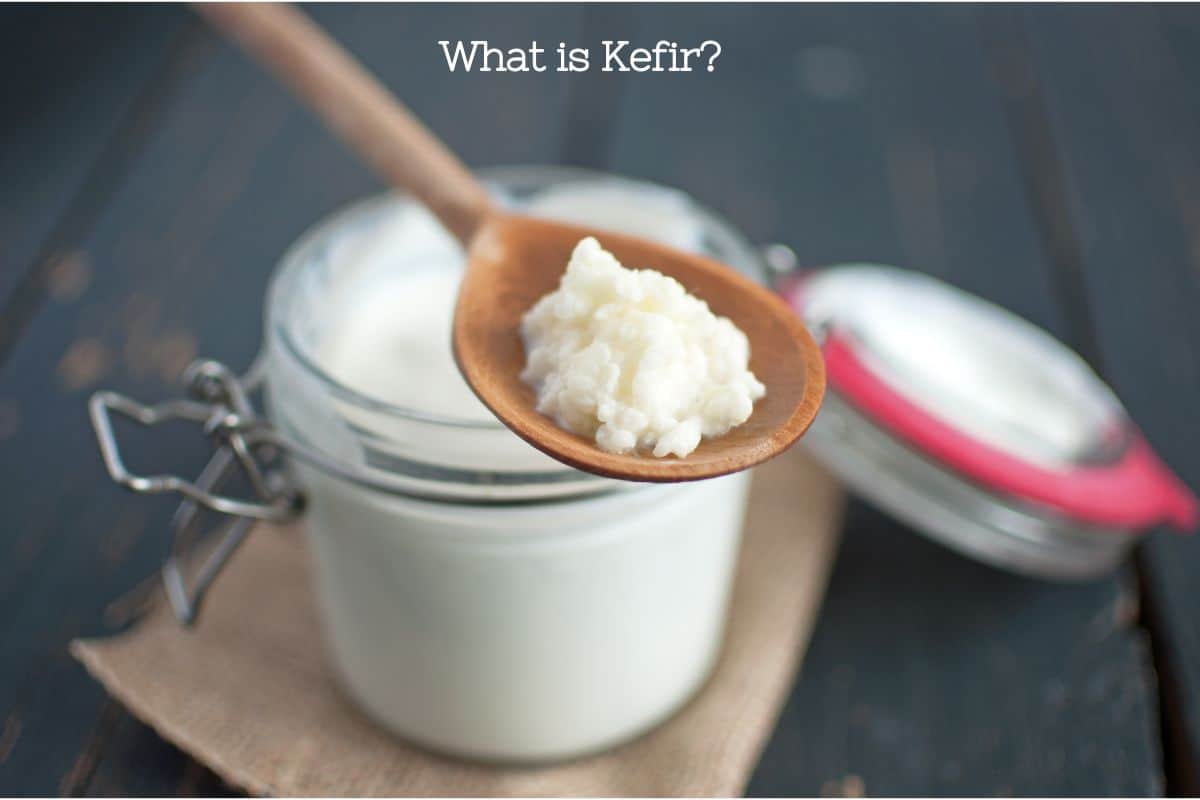
Kefir grains, a fusion of bacteria and yeast, introduce a transformative touch to milk, orchestrating a fermentation process that yields a plethora of beneficial microorganisms. Kefir milk is one of the most beneficial probiotic-rich foods available!
It is perfect for use daily. For the best experience, simply take a few sips in the morning before starting your day to help balance your gut and keep bad bacteria at bay.
Notably, kefir boasts a tangy and slightly sour flavor. This tanginess arises from the microbial conversion of lactose, the natural sugar present in milk, into lactic acid. This intricate microbial interplay infuses kefir with its distinctive flavor spectrum.
The true beauty of kefir lies in its microbial diversity.
In contrast to certain probiotic foods and drinks, kefir showcases a remarkable array of beneficial bacteria strains that heal and prime the gut.
From the renowned Lactobacillus to lesser-known but equally essential strains, each contributes to kefir's holistic health prowess.
Beyond its probiotic content, kefir presents a treasure trove of nutrients. It serves as a notable source of protein, vitamins, and minerals such as calcium and vitamin K2.
Moreover, the fermentation process enhances its digestibility, enabling the body to access these nutrients effectively (bioavailability).
One of the best parts of kefir is its versatility and adaptability to various dietary preferences.
Beyond traditional milk, kefir can be crafted from alternative options like goat's milk or coconut milk and other plant-based alternatives.
This extends the benefits of kefir's microbial symphony to those seeking non-dairy avenues for wellness. Personally, I love coconut milk kefir! It is so simple to make and is a wonderful addition to my daily health routine.
In essence, kefir bridges the gap between traditional and contemporary insights. With its distinctive sour taste and microbial vibrancy, kefir offers a plethora of benefits for gut health, digestion, and overall vitality.
 Maple Hill Creamery, 100% G...Shop on Amazon
Maple Hill Creamery, 100% G...Shop on Amazon
 Cultures for Health Water K...Shop on Amazon
Cultures for Health Water K...Shop on Amazon
Comparing Yakult to Kefir
When it comes to selecting probiotic options, the debate often circles choices like Yakult and kefir. Let's delve into the intricacies of these two popular contenders and see where they stand.

Yakult has carved a niche as a go-to probiotic drink, offering a quick fix of beneficial bacteria for digestive health.
It contains specific strains like Lactobacillus casei Shirota, known for their potential to support gut balance. However, it's important to note that Yakult may contain additives and artificial sweeteners, which might not align with natural health goals.
Kefir steps up with a broader probiotic spectrum owing to its diverse fermentation process. Whether from dairy or plant-based milk, kefir's microbial richness appeals to various dietary preferences.
This resonates more harmoniously with the holistic nutrition approach, offering not just probiotics, but also nutrients like vitamins, minerals, and protein.
Where the comparison gains significance is in the realm of additives.
While Yakult's ingredient list might raise concerns in the long run, kefir stands strong as a more natural choice that sidesteps additives that could potentially counteract your wellness goals.
In the Yakult vs. Kefir debate, the latter stands tall as a more comprehensive and potentially fruitful choice.
Kefir's natural diversity, customizable preparation, and nutrient-rich nature align with holistic living principles.
As you navigate the options, keep in mind that kefir offers a promising avenue for cultivating a thriving gut microbiome and embracing a more natural approach to wellness.
Nutritional Comparison Table
| Nutritional Content | Yakult | Kefir |
|---|---|---|
| Probiotic Strains | Lactobacillus casei Shirota | Diverse range of bacterial strains |
| Artificial Additives | Yes | Minimal to none |
| Nutrient Density | Limited vitamins and minerals | Rich in vitamins, minerals, and protein |
| Sweeteners | Artificial sweeteners present | Natural or limited sweeteners |
| Dairy or Plant-Based | Typically dairy | Dairy or plant-based options available |
| Customization | Limited flavor variations | Versatile in flavor customization |
| Long-Term Impact | Artificial additives may deter goals | Nutrient-rich, holistic benefits |
Recipe
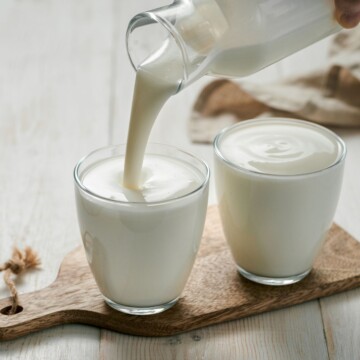
DIY Kefir Recipe: Two Ways
Equipment
- 1 cheese cloth or milk bag
- 1 rubber band
- 1 spoon wooden or plastic- no metal
Ingredients
- 1 can full fat coconut milk (organic)-or you can use 1.5 cups raw cow or goat milk
- 1 TB kefir grains or you can use one probiotic capsule opened and sprinkled into the milk (be sure to get live probiotics in the refrigerated section with at least 15 billion CFUs and a diverse array of strains)
Instructions
- Add the milk to the glass jar
- Add the kefir grains or probiotic powder
- stir with a non-metal spoon and cover with a cheese cloth and rubber band. do not put the metal lid on.
- Set in a warm or room temperature area in your kitchen for 24-48 hours and stir.
- If using kefir grains, strain the grains out with a non-metal strainer -the cheesecloth will work and save for later use (use again within 3-4 days or the grains die or eat themselves)
- Place the lid on the mason jar with the kefir and store in the fridge for up to 4 days. Works well taking a few sips each morning or throughout the day to populate the gut.
Notes
Nutrition
FAQ
Consuming fermented foods that are probiotic-rich like kefir, yogurt, kombucha, and fermented vegetables is always a better and more bioavailable way to get your good bacteria for gut health. The pills have more of a chance of losing potency or dying in the process of manufacture, transport, storage, and even during the digestion process. While some may be helpful, it is always best to consume whole and natural foods.
For those just starting out, Yakult may not be a terrible choice. However, the ingredients of added sugars and mass production of the product may leave much to be desired. Furthermore, there is only one strain used in Yakult while many other products have a spectrum of probiotic strains for more well-rounded healing. Making your own kefir is best!
When it comes to probiotic content, kefir has higher levels of probiotics and more diverse strains. This gives it a more balanced and well-rounded boost for your gut microbiome.
Check out our web story here!
Do you make kefir at home? What is your favorite method? Let us know in the comments below! Don't forget to subscribe to our email list for more up-to-date health and wellness benefits and delicious recipes! Share this recipe with your friends and follow us on social media. We'll see you next time!
Be well,
Natalie

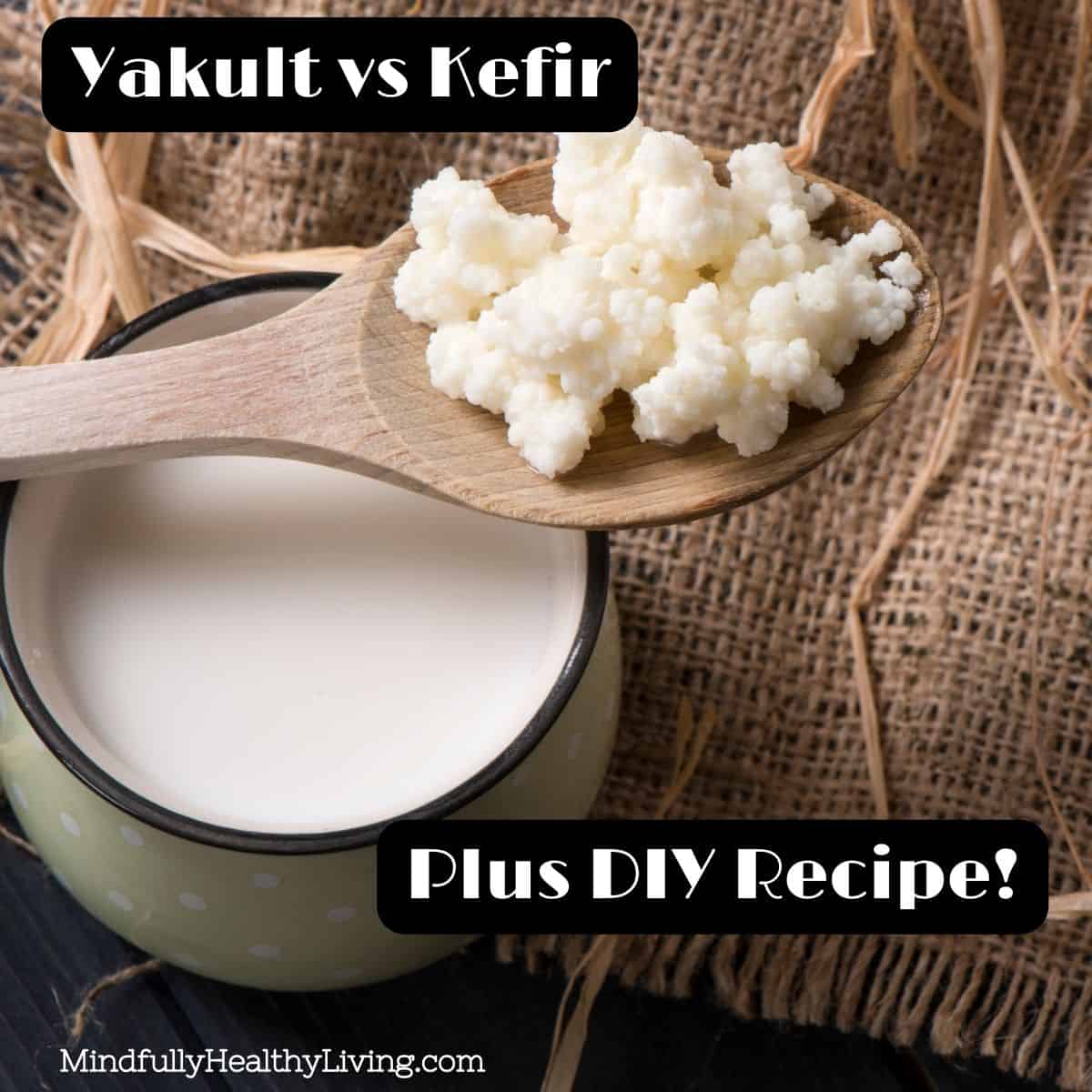
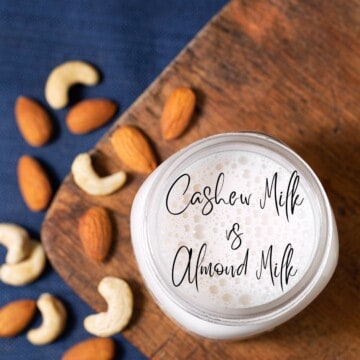
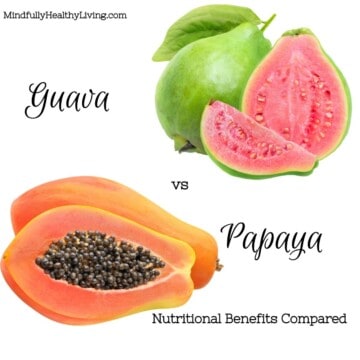
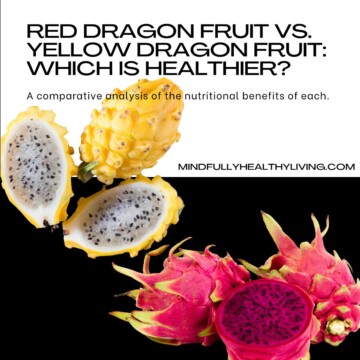
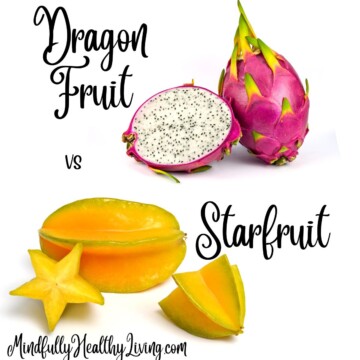
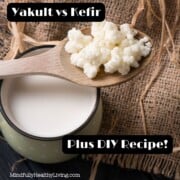

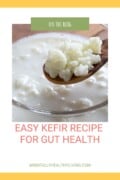

Nora says
Awesome article and recipes! Didn't know how easy it is to make kefir at home! Thanks!
Natalie Perry says
it really is so easy! Thank you!
Conchetta says
Wow! I learned alot- great article. I love the recipes on this site. Brilliant!
Natalie Perry says
Thank you!
Andréa Janssen says
Thank you for the great explanation of kefir. It was very clear, and the recipe is easy to prepare.
Natalie Perry says
You are welcome 🙂
Mary says
Lots of good information here! I am transitioning for an unhealthy diet to a healthy diet and need all the help I can get. Thanks!
Natalie Perry says
Wonderful! Welcome aboard. 🙂 Feel free to ask any questions that may come up along the way. We are here to help!